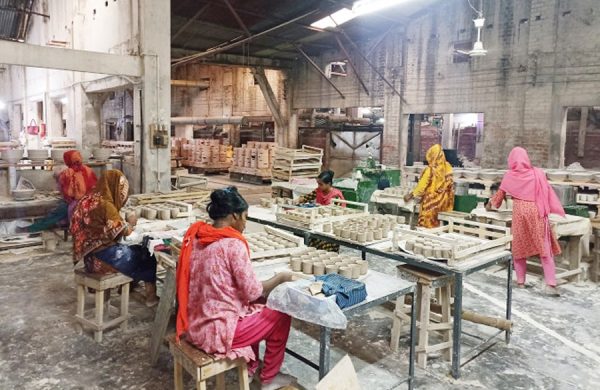Bogura emerges as a highflyer in country’s ceramic industry
- Update Time : Tuesday, August 19, 2025

Bogura Correspondent:
Bogura-the northern gateway to Bangladesh – has quietly emerged as a powerhouse in the country’s ceramic industry, with six major factories generating nearly Tk10 billion in annual sales and employing about 50,000 workers.
Industry insiders said the district now contributes roughly 30 per cent of the country’s ceramic output.
Leading the way is Tajma Ceramics, widely believed to be the country’s first ceramic manufacturer.
Abdul Jabbar (late) had established Tajma Ceramics in 1959 with support from Japanese firm Nichiman Trading House.
Tajma Ceramics began with tableware production and today manufactures over 60 types of products, including plates, cups, glasses, jugs, mugs, bowls, soup sets, vases, and decorative items.
Monthly sales reach about Tk10 million, while annual output stands at more than 11,000 pieces – about 1,500 tonnes of tableware.
The company has invested nearly Tk 10 billion and employs 250 people, most of them women.
Despite strong overseas demand, Tajma has shifted focus to the domestic market due to production capacity constraints, said Joint Managing Director Md Shorifuzzaman, the maternal grandson of Mr Jabbar.
Other industrial heavyweights in Bogura include ABC Tiles, BCL Tiles, Pawan Ceramic, Sajal Ceramics, and Cosmo Sanitary, producing tiles, sanitaryware, and tableware.
Around 600 small factories supply raw materials and parts to these large plants.
S M Mahbub Alam, owner of Pawan Ceramic, attributes the growth of Bogura’s ceramic industry to its stable natural environment – free from major flooding, cyclones, and earthquakes – as well as its good transport links, easy access to raw materials, and reliable fuel supply. “The people here are extremely enterprising,” he said.
Key raw material china clay is sourced domestically from Mymensingh, Sylhet, and Netrokona, as well as imported from China, India, Malaysia, Thailand, Vietnam, Saudi Arabia, New Zealand, and Germany. Bogura’s distinctive red clay is also used by BCL Ceramic, a subsidiary of TMSS, which produces parking tiles using a mix of imported and local materials.
Managing Director TM Ali Haider claims their high-quality products have resulted in “no complaints cell” being necessary.
Despite growth, manufacturers face steep import duties – raw materials for ceramics are taxed at 30 per cent as “luxury goods” – and high bank interest rates.
Gas, which accounts for about 12 per cent of production costs, has seen a price hike of nearly 40 per cent between 2019 and 2022, squeezing margins as product prices cannot be raised proportionately.
BCL’s Additional Managing Director (Operations), Md. Mesbaur Bari said one unit currently produces 70,500 square feet of tiles daily, valued annually at Tk450 million.
“We contribute about 3.0 per cent to the national ceramic sector from BCL alone. With better policy support, we could contribute much more,” he said. ABC Tiles – part of Azad Group – produces 300,000 square feet of floor and wall tiles daily, worth Tk13.5 million, and also operates Cosmo Sanitary, selling Tk 1.0 billion worth of sanitaryware annually, according to Bogura Chamber of Commerce and Industry Secretary Md. Masud Rana, Bangladesh has more than 70 ceramic factories nationwide, five of which are in Bogura.
Of the country’s 20 tile factories, three operate in the district. Over the past one decade, production in Bogura’s ceramic sector has grown 200 per cent, and local market sales now total about Tk 10 billion annually. The sector has attracted over Tk70 billion in investments and employs nearly 50,000 people directly and indirectly.













